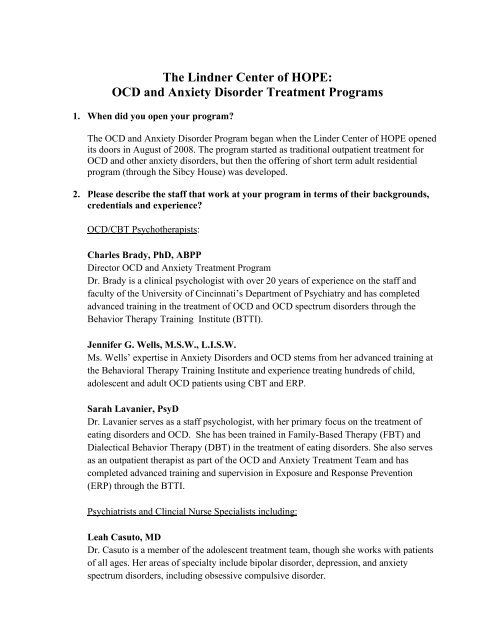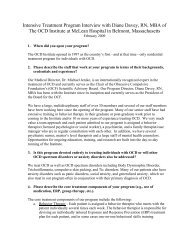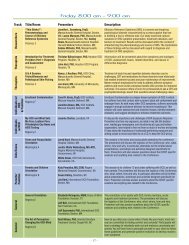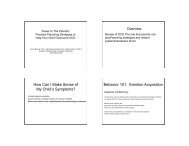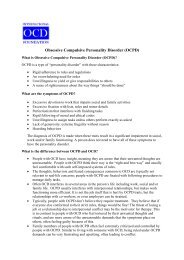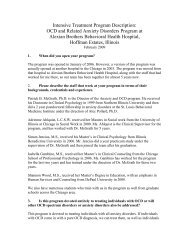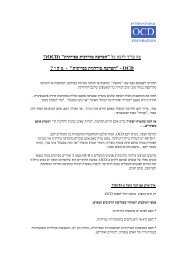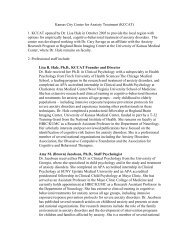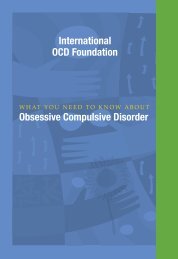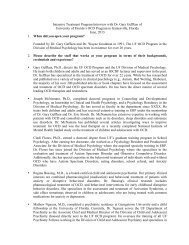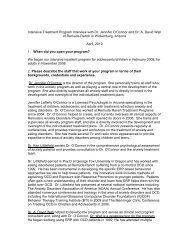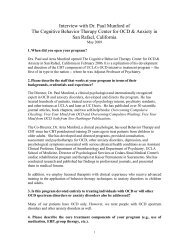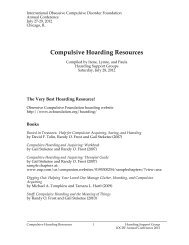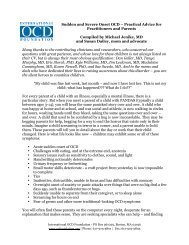The Lindner Center - Obsessive Compulsive Foundation
The Lindner Center - Obsessive Compulsive Foundation
The Lindner Center - Obsessive Compulsive Foundation
You also want an ePaper? Increase the reach of your titles
YUMPU automatically turns print PDFs into web optimized ePapers that Google loves.
<strong>The</strong> <strong>Lindner</strong> <strong>Center</strong> of HOPE:<br />
OCD and Anxiety Disorder Treatment Programs<br />
1. When did you open your program<br />
<strong>The</strong> OCD and Anxiety Disorder Program began when the Linder <strong>Center</strong> of HOPE opened<br />
its doors in August of 2008. <strong>The</strong> program started as traditional outpatient treatment for<br />
OCD and other anxiety disorders, but then the offering of short term adult residential<br />
program (through the Sibcy House) was developed.<br />
2. Please describe the staff that work at your program in terms of their backgrounds,<br />
credentials and experience<br />
OCD/CBT Psychotherapists:<br />
Charles Brady, PhD, ABPP<br />
Director OCD and Anxiety Treatment Program<br />
Dr. Brady is a clinical psychologist with over 20 years of experience on the staff and<br />
faculty of the University of Cincinnati’s Department of Psychiatry and has completed<br />
advanced training in the treatment of OCD and OCD spectrum disorders through the<br />
Behavior <strong>The</strong>rapy Training Institute (BTTI).<br />
Jennifer G. Wells, M.S.W., L.I.S.W.<br />
Ms. Wells’ expertise in Anxiety Disorders and OCD stems from her advanced training at<br />
the Behavioral <strong>The</strong>rapy Training Institute and experience treating hundreds of child,<br />
adolescent and adult OCD patients using CBT and ERP.<br />
Sarah Lavanier, PsyD<br />
Dr. Lavanier serves as a staff psychologist, with her primary focus on the treatment of<br />
eating disorders and OCD. She has been trained in Family-Based <strong>The</strong>rapy (FBT) and<br />
Dialectical Behavior <strong>The</strong>rapy (DBT) in the treatment of eating disorders. She also serves<br />
as an outpatient therapist as part of the OCD and Anxiety Treatment Team and has<br />
completed advanced training and supervision in Exposure and Response Prevention<br />
(ERP) through the BTTI.<br />
Psychiatrists and Clincial Nurse Specialists including:<br />
Leah Casuto, MD<br />
Dr. Casuto is a member of the adolescent treatment team, though she works with patients<br />
of all ages. Her areas of specialty include bipolar disorder, depression, and anxiety<br />
spectrum disorders, including obsessive compulsive disorder.
Angela Couch, RN, MSN, PMHNP-BC<br />
Ms. Couch has been practicing as an ANCC Board Certified Adult Psychiatric Mental<br />
Health Practitioner since 2004. She is a graduate of the IOCDF’s BTTI.<br />
Tracy Suzanne Cummings, MD<br />
Dr. Cummings serves as a staff psychiatrist for <strong>Lindner</strong> <strong>Center</strong> of HOPE, working in both Sibcy<br />
House and the outpatient department. She specializes in the assessment and treatment of children<br />
through emerging adulthood.<br />
Elizabeth Wassenaar, MS, MD<br />
Dr. Wassenaar serves as a staff psychiatrist for <strong>Lindner</strong> <strong>Center</strong> of HOPE, working on the<br />
<strong>Center</strong>’s Sibcy House unit and in the outpatient department. She is triple boarded in<br />
pediatrics, adult psychiatry and Child and Adolescent Psychiatry.<br />
Other Staff (Hospital clinical staff for all services):<br />
• Masters or Doctoral-level <strong>The</strong>rapists and Psychology interns provide additional<br />
assistance with individual behavioral therapy practice and with group therapy sessions.<br />
• Primary Care Physicians provide ongoing monitoring and care for non-psychiatric<br />
medical needs.<br />
• Social Work staff offer assistance in coordinating a wide range of patient and family<br />
needs and concerns.<br />
• Registered Nurses, Licensed Practical Nurses and Mental Health Specialists are on-site<br />
24 hours per day to ensure an atmosphere of wellness promoting, safe, effective patient<br />
centered care.<br />
• Dietitian provides as-needed nutritional evaluation, and ongoing individual nutrition<br />
education and meal planning.<br />
• Life Skills Development Coach works with the patient’s treatment team to identify the<br />
individual’s goals for a full, meaningful life, such as securing a job or volunteer position,<br />
living independently, maintaining a healthy lifestyle, or healthy relationships.<br />
• Spiritual Care Coordinator is available to provide individual support and monitoring of<br />
spiritual needs.<br />
3. Is this program devoted entirely to treating individuals with OCD or will other<br />
OCD spectrum disorders or anxiety disorders also be addressed<br />
<strong>The</strong> OCD and Anxiety Disorder program has been developed to help individuals learn<br />
how to take scientifically proven steps to free themselves from the grasp of numerous<br />
anxiety conditions including, obsessive compulsive disorder, panic disorder, social<br />
anxiety, generalized anxiety disorder, phobias and other disorders.
4. Please describe the core treatment components of your program (e.g., use of<br />
medication, ERP, group therapy, etc.).<br />
<strong>The</strong> OCD and Anxiety Treatment Program utilizes an individually tailored treatment<br />
approach combining Cognitive Behavioral <strong>The</strong>rapy and medication treatment. Cognitive<br />
Behavioral <strong>The</strong>rapy with specific emphasis on Exposure and Response Prevention (ERP)<br />
is a based on the scientifically proven principle that anxiety and distress (obsessions) can<br />
be overcome when someone confronts their fear or distress rather than avoiding it or<br />
neutralizing it with ritualistic behaviors (compulsions). <strong>The</strong> process of utilizing ERP is<br />
maximized through one-on-one guidance by expert therapists in a manner that the<br />
individual patient guides and controls.<br />
Traditional Outpatient<br />
<strong>The</strong> traditional outpatient services offers outpatient sessions with the <strong>Center</strong>’s seasoned<br />
CBT therapists and medication consultation through the <strong>Center</strong>’s physicians and clinical<br />
nurse specialists. Individual and family psychotherapy sessions are offered on a regular<br />
basis according to each patient’s need. Patients learn the use of therapist assisted and<br />
self-directed ERP and inter-session exercises are developed to optimize the recovery<br />
process.<br />
Sibcy House (Adult Residential)<br />
<strong>The</strong> <strong>Lindner</strong> <strong>Center</strong> of HOPE’s adult residential program through the Sibcy House allows<br />
for intensive treatment for individuals seeking to recover from OCD or other severe<br />
anxiety disorders (e.g., Panic Disorder, Generalized anxiety Disorder, Phobias, etc….).<br />
Each resident will participate in 2-5 hours of daily ERP with daily monitoring of<br />
medication. Residents will participate in 3-5 individual sessions per week with the <strong>Center</strong><br />
of HOPE’s OCD/CBT psychotherapists. <strong>The</strong>se sessions will be bolstered by an<br />
additional 2-4 hours of ERP with assistance from CBT trained <strong>Center</strong> of HOPE staff. <strong>The</strong><br />
Sibcy House offers single occupancy rooms and 24/7 nursing care. In addition to ERP<br />
and medication treatment, residents will be able to participate in the <strong>Center</strong> of HOPE’s<br />
offerings of the following:<br />
• Off-site ERP practice<br />
• Cognitive <strong>The</strong>rapy Groups<br />
• Illness Management and Recovery Groups<br />
• Mindfulness Training<br />
• Yoga<br />
• Spirituality/Wellness Groups<br />
• Patient and family education<br />
• Vocational Services<br />
• Nutritional counseling
5. Please describe the treatment planning process at your program.<br />
A thorough treatment plan is developed, in collaboration, with every patient at the<br />
<strong>Lindner</strong> <strong>Center</strong> of HOPE. With a model that views the patient as the head of their<br />
treatment team, each clinician contributing to the individual’s treatment provides input<br />
into the treatment plan which is reviewed and signed by the patient. In addition to the<br />
Sibcy House treatment team that meets weekly, the LCOH OCD and anxiety treatment<br />
team meets weekly to enhance communication, review and plan care.<br />
6. If someone has a co-morbid condition, can he or she participate in your program<br />
Will there be treatment for the co-morbid condition If so, can you give an<br />
example<br />
Individuals with co-morbid conditions are welcome. <strong>The</strong> <strong>Lindner</strong> <strong>Center</strong> of HOPE also<br />
provides specialized care for persons with eating disorders or co-occurring substance<br />
abuse disorders.<br />
7. Are parents, family members, friends, teachers, etc. included in the treatment If<br />
yes, please describe how.<br />
<strong>The</strong> <strong>Lindner</strong> <strong>Center</strong> of HOPE prides itself in providing patient-centered and familycentered<br />
care. We encourage all of our patients to include family members in as much of<br />
their recovery as they will allow. Our staff is trained and experienced in helping family<br />
members learn how to assist their relative’s management of their anxiety more effectively<br />
in a humane, caring and recovery-enhancing manner. Family members are welcome to<br />
participate in treatment planning, educational sessions, and therapy sessions. <strong>The</strong>re may<br />
be times where a family member’s presence may serve as an anxiety-fueling form of<br />
reassurance. When this occurs staff will help the patient and families recognize this<br />
pattern and work towards a solution that enhances the patient’s ability to master their<br />
anxiety.<br />
Similarly, when patients consent, teachers, employers or other significant individuals are<br />
included in the treatment dialogue to enhance the individual’s ability to apply the gains<br />
they make in the program to their natural day-to-day life.<br />
We are also thrilled to serve as the host site for a monthly support group for parents of<br />
children, teens or young adults with OCD. This group is open to family members,<br />
regardless of whether their relative is receiving treatment at the center.<br />
8. How often do patients in the program meet with staff individually How long are<br />
these individual sessions<br />
Traditional outpatient:<br />
Weekly or every other week meetings for 50 to 90 minutes.
Sibcy House (Residential): a) 3 to 5 individual sessions per week with the CBT<br />
psychotherapists.<br />
b) 2-4 hours of ERP with assistance from CBT trained staff<br />
9. Is there a set time period for a patient’s treatment in the program What is the<br />
overall time commitment to the program (for example, attend daily for three<br />
weeks) How much flexibility is there in extending someone’s stay if needed<br />
<strong>The</strong> Sibcy residential program is designed as a 4 week program. Flexibility exists to<br />
extend the stay in treatment if the specific circumstances suggest that the patient will<br />
benefit as a result.<br />
10. Is there a homework or “self directed” component to the treatment<br />
In all facets of the OCD and Anxiety Disorders Program at the Linder <strong>Center</strong> of HOPE,<br />
homework and self-directed exposure are seen as essential components of recovery from<br />
anxiety. In order to maximize the learning and freedom from anxiety, the individual<br />
benefits most from seeing themselves as mastering their anxiety in as independent<br />
fashion as possible. Homework is developed in collaboration with the patient to increase<br />
likelihood of success and enhanced self-worth that occurs through successful selfdirected<br />
ERP.<br />
11. Please describe the relapse prevention strategies you use in your program.<br />
Individuals are instructed on how to observe for early warning signs of OCD and anxiety<br />
and are coached on techniques that can be used intermittently over time to reduce the<br />
chance for relapse. Each patient is encouraged to develop a Victory Log that chronicles<br />
their successes over the anxiety which they can refer to in the future for renewed<br />
confidence and to remind themselves of past successful strategies.<br />
12. What kind of follow-up do you do for those who complete your program Will the<br />
members or your treatment team be in contact with or willing to consult with the<br />
individual’s regular treatment provider(s)<br />
Once the resident completes the residential or intensive outpatient program, a member of<br />
the individual’s treatment team staff will contact each patient after treatment to help<br />
sustain continued successful recovery. In addition, a treatment summary and phone call to<br />
the individual’s non-<strong>Center</strong> of HOPE mental health treatment provider will be offered to<br />
ensure continuity of care. Members of the resident’s treatment team remain available for<br />
consultation calls with all aftercare providers.
13. Do you offer a sliding fee scale or scholarships for those who cannot afford your<br />
program<br />
Unfortunately at this time we do not have scholarships available for this program and<br />
only a limited sliding fee scale for a certain portion of our programming. Discounts that<br />
are available are based on the patient/family income compared to Federal Poverty<br />
Guidelines. Patients are evaluated on a case by case basis and within the guidelines of the<br />
<strong>Lindner</strong> <strong>Center</strong> of HOPE charity care policy.<br />
14. Does your program only work with individuals who are local or are there<br />
arrangements for those who come from farther away (for example, lodging<br />
arrangements)<br />
Patients who participate in the clinical and research programs at the <strong>Lindner</strong> <strong>Center</strong> of<br />
HOPE include local residents as well as those who have sought treatment from across the<br />
country and from other nations. For those patients who come from father away, the<br />
<strong>Lindner</strong> <strong>Center</strong> of HOPE is located with easy access to the Cincinnati-Covington<br />
International Airport, and is located within a few minutes of several quality hotels where<br />
patients and/or families can stay.<br />
15. Please add any information you think would be helpful in describing the unique<br />
aspects of your program if this has not been covered in the questions above.<br />
<strong>The</strong> <strong>Lindner</strong> <strong>Center</strong> of HOPE is a freestanding mental health treatment facility in<br />
North America and is built on an innovative, scientifically-based model that provides<br />
comprehensive mental health services. <strong>The</strong> <strong>Center</strong> itself is an award winning facility<br />
where patients, families and clinicians work together in a family-centered atmosphere.<br />
We have a distinguished and diverse clinical team that includes psychiatrists,<br />
psychologists, neuropsychologists, addictive disorder specialists, advanced practice<br />
nurses, dietitians, family therapists, licensed independent social workers and licenses<br />
professional clinical counselors. We have internationally recognized experts in<br />
depression, bipolar disorder, suicide and neurocognition, and two of our psychiatrists are<br />
amount the top 10 most cited scientists publishing in psychiatry and psychology every<br />
year since 1996.<br />
All patients who come to <strong>Lindner</strong> <strong>Center</strong> of HOPE benefit from the depth our clinical<br />
expertise, our research and the breadth of our services, technology and programming. As<br />
part of our comprehensive services, our OCD program is considered a specialty track,<br />
and our clinicians bring decades of experience and real hope to caring for our patients.


